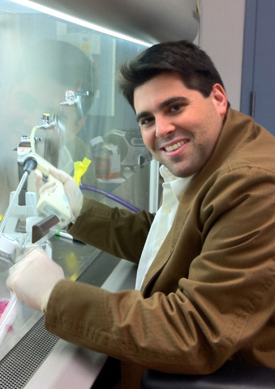BERKELEY, CA (UroToday.com) - Based on the rationale that individuals incapable of adequately detoxifying a toxic agent or a metabolic carcinogen would undergo more DNA and cell damage with the formation of adducts or chemical elements bound to DNA and protein macromolecules, genomic instability and, consequently, would have a greater risk of developing tumors, N-acetyltransferases (NAT2) are particularly interesting because they are believed to be pivotal to the activation of aromatic or heterocyclic amines, metabolizing important carcinogenic products directly involved in the tumor initiation process.
 NAT are polymorphic in the population and this prospective case–control study indicates that NAT2 polymorphisms participate in prostate pathogenesis and that slow-acetylator NAT2 genotypes may be a biomarker for prostate cancer (PCa) in Brazilian patients as it was proposed in the Japanese population.[1] However, we were unable to demonstrate any relationship between genotypes and parameters of aggressiveness at diagnosis or during follow-up.
NAT are polymorphic in the population and this prospective case–control study indicates that NAT2 polymorphisms participate in prostate pathogenesis and that slow-acetylator NAT2 genotypes may be a biomarker for prostate cancer (PCa) in Brazilian patients as it was proposed in the Japanese population.[1] However, we were unable to demonstrate any relationship between genotypes and parameters of aggressiveness at diagnosis or during follow-up.
Our data indicate that the inheritance of a NAT2G590A genotype may represent a protective factor against prostate diseases, whereas NAT2A803G genotype may be a factor of risk for both benign prostatic hyperplasia (BPH) and PCa. Allele frequency can be modified by several population features including gender, but our data were reinforced by NAT2 genotype distribution comparison between prostate disease patients and healthy women confirming the protective effect of NAT2G590A genotype.
Pioneering on the issue, all patients underwent biopsy and histological confirmation of PCa or BPH to avoid the bias of possible undetected PCa cases in our BPH population. The use of 12-puncture biopsy in all patients reinforced our study since this is an effective screening method for prostate cancer patients, including those at low risk. The biopsy-proven diagnosis of BPH and PCa is unique in this series, strictly and histologically defining the non-cancer group phenotype, emphasizing our results, compared with the unproven evidence of cancer in the control group of previous studies.
Furthermore, conclusions from acetylator genotyping studies require understanding the relationship between genotype and phenotype. The highly heterogeneous ethnic composition of the Brazilian population might help dilute ethnic bias and strengthen our results. Patients who had a first-degree relative (brother or father) with a confirmed diagnosis of PCa were excluded to avoid familial prostate cancer cases.
Considering that ethnic asymmetrical distortions in the population studied may be statistically more significant than the association of variant alleles with the disease analyzed, study groups should be matched for age, gender, ethnicity, geographic origin, environment and in some cases, dietary exposition. Such a design would reduce the influence of confounding factors and strengthen the present study The control health population confirmed the results and allowed the exclusion of possible biases caused by gender influence on genotype inheritance and by the inclusion of not diagnosed prostate diseases patients among the control individuals.
We suggest that the investigation of germline polymorphisms of NAT2 gene may be useful in the assessment of Latin American patients at risk of BPH and PCa. Further studies and phenotype analysis of these genotypes are needed to better an understanding of their role in prostate cancer pathogenesis, once NAT polymorphisms likely represent one of many low-penetrance genetic polymorphisms.
The association of any polymorphism with risk can be very challenging, and while this is the first study in Latin America, future studies need to be population-based, including many cases and controls and should add a systematic assessment of genetic variation within the population.
Reference:
- Hamasaki T, Itamoni H, Katoh T, Aono H, Ikuyama T, Marutami T, et al. N-acetyltransferase-2 gene polymorphism as a possible biomarker for prostate cancer in Japanese men. Int J Urol. 2003;10:167.

Click the thumbnail to view the moderated poster presented at the 2012 AUA Congress, Atlanta, GA, Abstract ID: 1729 - Benign Prostatic Hyperplasia: Epidemiology and Natural History/Evaluation and Markers. Track: Voiding Dysfunction/BPH/Female Urology; Tuesday, May 22, 2012; 1:00 PM-3:00 PM, Georgia World Congress Center, B 312.
Pre-selected for presentation at the 2012 Best of AUA Annual Meeting to be held in Tokyo, Japan, from October 13-14, 2012.
Written by:
Leonardo Oliveira Reis, MD, MSc, PhD as part of Beyond the Abstract on UroToday.com. This initiative offers a method of publishing for the professional urology community. Authors are given an opportunity to expand on the circumstances, limitations etc... of their research by referencing the published abstract.
Department of Surgery (Urology)
School of Medical Sciences
University of Campinas, UNICAMP, Brazil
www.fcm.unicamp.br/deptos/urologia
Professor
of Medicine (Urology)
Center for Life Sciences
Pontifical Catholic University of Campinas
PUC-Campinas, Brazil

More Information about Beyond the Abstract


